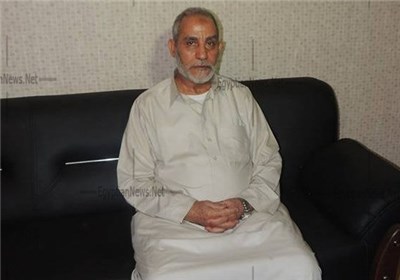Egypt Death Sentence Handed to Grand Mufti

An Egyptian court seeks the death penalty for the Muslim Brotherhood’s top leader Mohamed Badie and 13 other members of the group for inciting chaos and planning attacks on police and army institutions, according to judicial sources.
The court formally referred the case to the grand mufti, the country’s highest Islamic legal official, which is the first step towards imposing a death sentence.
Egyptian law requires any capital sentence to be referred to the mufti for a religious opinion before any execution can take place, although the mufti’s ruling is not binding.
Once the court issues a final verdict, set for April 11, the defendants can appeal it.
The 14 include the Brotherhood’s Salah Soltan, a preacher, and Saad al-Hosseiny, former governor of Kafr el-Sheikh province, Reuters reported.
Egypt has jailed thousands linked to the Muslim Brotherhood since the army removed Mohamed Mursi from power in July 2013, a year after the Muslim Brotherhood-backed politician was elected president, following mass protests against his rule.
As the supreme guide of the now-outlawed Brotherhood, Badie has already been sentenced to multiple life terms.
He was one of hundreds given the death sentence in a mass trial last year that drew international criticism of Egypt’s judicial system.
President Abdel Fattah el-Sisi, who as army chief toppled Mursi, describes the Brotherhood as a major security threat.
The Brotherhood says it is committed to peaceful activism and had nothing to do with recent violence.
The state news agency MENA said the judge overseeing Monday’s decision was Mohamed Nagi Shehata, who has played a prominent role in the Egyptian judiciary’s mass jailings of anti-government demonstrators.







